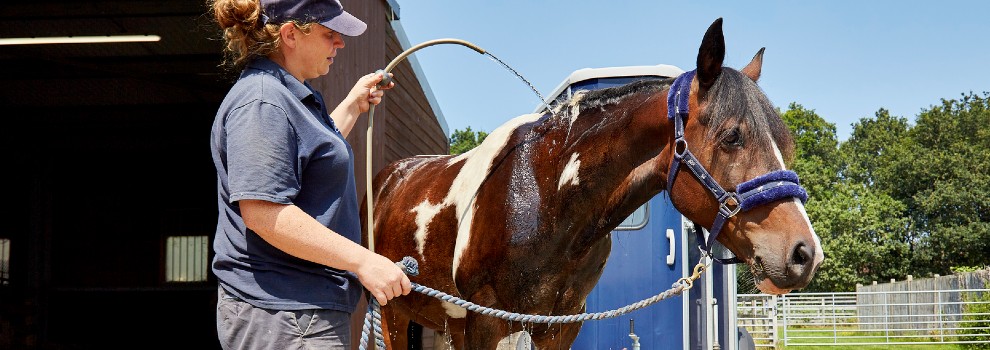- Find a Pet
- Advice and Welfare
- Ways to Give
- Get Involved
- What We Do
- Search
- My RSPCA
- Report a concern
- Gift in Wills
-
Colour modeVivid Calm
- Home
- Advice and welfare
- Seasonal advice
- Summer
- Horse care in summer
Horse care in summer
The summer can mean lots of opportunities for you and your horse to enjoy the warmer weather. However, as with other animals, horses are prone to dehydration and can suffer from heat exhaustion and heatstroke, especially as they're usually outside in the sun.
There are lots of ways you can help keep your horse happy and healthy all year round, from providing plenty of water and shade to riding earlier or later in the day. If you suspect your horse may be suffering in the heat, we'll also cover what to do to help them.

How can I keep my horse cool in hot weather
Firstly, how hot is hot? Research on horses working in the heat considers 28-30°C and above as 'hot', but don't forget that humidity also makes a difference. High humidity reduces the effectiveness of evaporative cooling through sweating. It's a good idea to monitor temperatures and humidity throughout the summer months.
Here's how you can keep your horse cool:
Plenty of water
It's really important to give your horses plenty of water all year round, especially in warmer weather. Horses typically need to drink up to 55 litres of water a day, and even more in hot weather, so they'll need full troughs or automatic watering systems rather than just a few buckets!
Horses rely heavily on sweating to keep cool and can produce sweat three times as fast as humans. That means they're at high risk of dehydration if they don't have continuous access to water to replace the large amounts lost as sweat. You should also give your horse a salt lick to help them replace the salts lost during sweating.
Shade
Constant access to shade is extremely important, whether from the natural shade of trees or man-made shelters. Shade is particularly important for elderly horses and foals.
Prevent sunburn
Horses with pink areas of skin, especially on the face, can be prone to sunburn. Using a good child-safe factor 50 sunblock, applied once a day to these areas, will help to reduce the risk of sunburn.
Ride and travel during cooler times of the day
In hot weather, ride your horse in the early morning or the evening, avoiding the hottest part of the day. You'll also make the most of the long summer days by riding during these times. Of course, don't forget your hi-viz, fluorescent and reflective clothing!
If you need to move your horse, leaving very early or very late in the day avoids the heat (and also the traffic!). The ventilation is much better for your horse when your vehicle is moving, as opposed to being stuck in traffic, so avoid travelling at peak times in summer.
Signs that your horse may be suffering in the heat
Your horse may be suffering if you notice any of these signs:
- Lethargy
- Fast, shallow breathing (panting)
- Elevated heart rate (normal for adult horses is 28-44 beats per minute)
- Eating less
- Drinking less
- Urinating less and dark urine
- Muscle spasms
- Poor ridden performance
How to check your horse for signs of dehydration
If your horse will let you, lift their upper lip and look at the gums above the teeth - they should be a healthy pink colour, shiny, moist and slippery. If they're pale, dry or tacky, this can be a tell-tale sign of dehydration.
You can perform a quick and easy test by applying firm pressure to your horse's gums with a thumb and seeing how long it takes for the pink colour to return after you remove your thumb. This should normally take 1-2 seconds; if it takes longer than this, your horse may be suffering from dehydration.
What to do if your horse is suffering from heat exhaustion or heatstroke
Heat exhaustion and heatstroke can lead to:
- Unsteadiness on the feet
- Collapse
- Kidney, liver and muscle damage
- Laminitis
If your horse shows any signs of these signs, call your vet for advice immediately.
Emergency first aid for horses suffering from heat exhaustion and heatstroke includes moving them to a shaded, cool area, and pouring large amounts of water over the body (if a hose is available you should use that). It may take 15 minutes of doing this before you notice any difference.
Follow the links below for more advice on caring for your horse.



